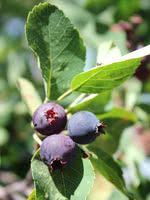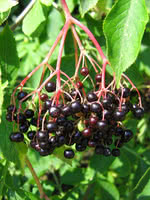Mon-Fri 9am - 5pm Mountain time
Northline Saskatoon (Serviceberry) vs Black Elderberry
Amelanchier alnifolia Northline
Sambucus canadensis
NOT AVAILABLE THIS SEASON - MIGHT RETURN
Top Selling Saskatoon Variety
Northline Saskatoon is a native shrub that's famous for its great-tasting fruit. The berries are terrific for fresh eating and cooking. The Saskatoon bush itself can be quite large and produces an abundance of fruit. Saskatoons are hardy and can tolerate partial shade and a variety of growing conditions.
Northline Saskatoon is popular because it seldom gets over 8 feet in height, which makes it ideal for U-Pick orchards and over-row harvester equipment. The uniform ripening of the berries in full clusters and the desirable sweet taste also make this variety a favorite.
Starting an orchard or another project using thousands of plants? Give us a call for special bulk rates!
Black Elderberry is a deciduous shrub native to eastern North America. You can plant this shrub in moist areas and it will help stabilize your soil. You can also use it on rural properties anywhere you'd use a lilac.
Black Elderberries are considered to be partially self-pollinating. So while they will still produce some berries without cross-pollination, planting with another variety will increase yields. Consider planting with Ranch Elderberry or Bob Gordon Elderberry.
Warning: the seeds, stems, leaves, roots, and uncooked berries of the Black Elderberry are poisonous to humans when eaten in quantity. You should cook the berries to make them safe for human consumption.
Northline Saskatoon (Serviceberry) Quick Facts
Black Elderberry Quick Facts
Toxicity: leaves, stems, and uncooked berries are poisonous to humans

